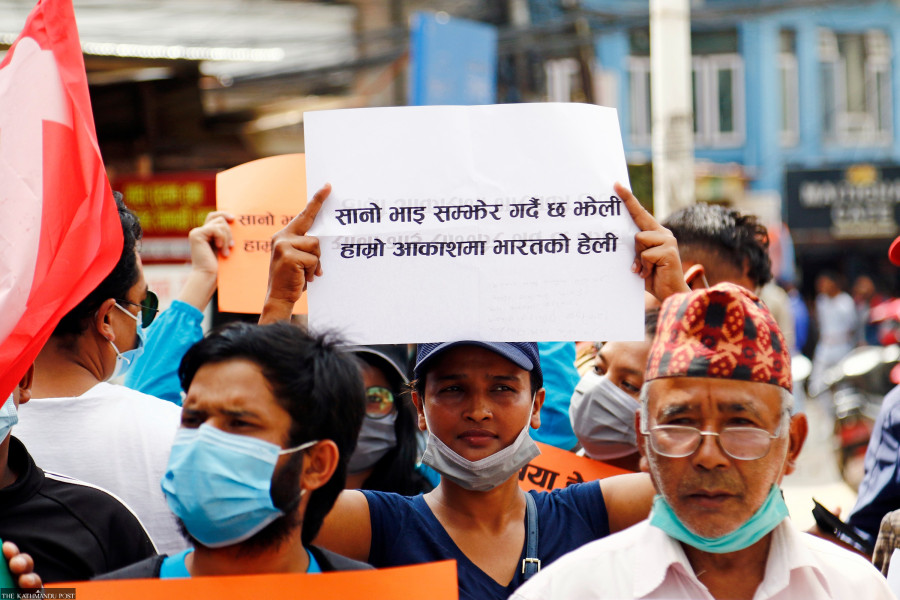National
Government on statement spree over protests, debates
After warning of action against those making statements on foreign-funded development projects, ministry objects to protests against Indian prime minister.
Post Report
Caught in a diplomatic dilemma, the government of late has been on a statement issuing spree, with two such statements in the past three days, in which the Home Ministry has not only urged people not to resort to protest but also warned of possible actions.
On Sunday, the Home Ministry in a statement said that its attention has been drawn to some activities like protests and sloganeering against the prime minister of a neighbouring country and burning him in the effigy.
“The ministry has taken serious objection to such activities,” reads the statement.
The ministry though has not mentioned the name of the prime minister, it is apparent that it is referring to Indian Prime Minister Narendra Modi.
The Sher Bahadur Deuba government’s failure to demonstrate urgency to take up the July 30 Darchula incident in which a youth had fallen into the Mahakali river has created quite an uproar in Kathmandu.
Jaya Singh Dhami, 33, from Khangdang Mal of Byas Rural Municipality-2 in Darchula fell into Mahakali while crossing the river using an improvised cable crossing, locally known as tuin. Media reports based on eyewitness accounts suggested that a member of India’s Sashastra Seema Bal (SSB) had untangled the cable just when Dhami was about to reach the Indian side, across the river.
A probe team formed by the government suggested that the incident took place “in the presence of” the Indian security personnel.
After submitting the probe team’s report to Home Minister Bal Krishna Khand on August 31, the ministry on September 2 wrote to the Ministry of Foreign Affairs to take diplomatic initiatives with India to find the truth about the incident and bring the culprit(s) to book.
On the same day, India said that it was unaware of any such incident in Darchula and about any investigation by Nepal.
“We have heard from the media, but we don’t have any official information on the matter,” Arindam Bagachi, spokesperson for India’s Ministry of External Affairs, said on Thursday during a regular press briefing on Thursday.
Last week, Kantipur, the Post’s sister paper, reported that Indian helicopters were flying in the Nepali skies and the Nepal government had failed to take up the sensitive issue to Delhi.
Many were quick to criticise the Deuba government’s timidity and failure to stand up to what they called “Indian high-handedness.”
On Friday, All Nepal National Free Student Union, a sister organisation of the CPN (Unified Socialist), a coalition partner in the Deuba government, burnt the Indian prime minister in effigy during a protest against Nepal government’s silence over Dhami’s disappearance and flying of Indian helicopters in Nepali skies.
In its statement, the Home Ministry has said that Nepal wants to further strengthen the country’s relationship with friendly countries and is committed not to allow any activities against any of the countries.
“We request everyone not to carry out any activities that could affect the dignity and independence of our friendly nations,” states the statement.
The ministry has also said that the government has been resolving the bilateral issues through dialogue and diplomatic channels and that a similar process would be followed in the future as well.
“We would like to inform that all the activities against our friendly nations would be controlled and action would be taken to anyone involved in such activities of taking the law into one’s hands,” the ministry has warned.
The statement from the ministry follows a similar statement on Friday, warning people not to make any negative comments against development projects running with the support of friendly nations, employees working on such projects, foreign nationals and their properties.
The statement came just as controversy over the Millennium Challenge Corporation (MCC) grew.
The MCC is an American programme, which was signed by Nepal and the United States in 2017, under which Nepal would receive $500 million in grants to be used in the electricity transmission and road projects.
In recent months, the US grant, however, has become a lightning rod for criticism, with many questioning the American intent for providing it to Nepal and the need for the parliamentary ratification of the programme. Those opposing the MCC say this is part of Washington’s Indo-Pacific Strategy and signing to the programme would push Nepal under the US security umbrella. Detractors also argue that some of the points in the MCC undermine Nepal’s sovereignty.
When Nepal signed the agreement in 2017, Deuba was the prime minister. The MCC bill has been pending in the Parliament since 2019 due largely to differences between political parties.
After Deuba’s return to power in July this year, the government was making preparations to get the MCC through the Parliament. And the controversy surrounding it raised its head again, with Deuba’s coalition partners also expressing their reservations about it endorsing it without making some amendments.
The Home Ministry statement on Friday was aimed at quelling protests against the MCC and growing negative debates on it.
“Nepal government’s serious attention has been drawn to the direct and indirect comments and threatening statements, through different media and social media, against development projects run with the support of friendly nations, their employees, foreign nationals and their properties in recent days,” states the statement signed by Phanindra Mani Pokharel, spokesperson for the Home Ministry.
The ministry has requested everyone not to indulge in any activities that would threaten implementation of development projects and affect relationships with friendly nations.
“The ministry is monitoring such activities and statements and analysing them minutely,” said the ministry. “Stern action will be taken as per the existing law against those carrying out such activities.”




 13.12°C Kathmandu
13.12°C Kathmandu













